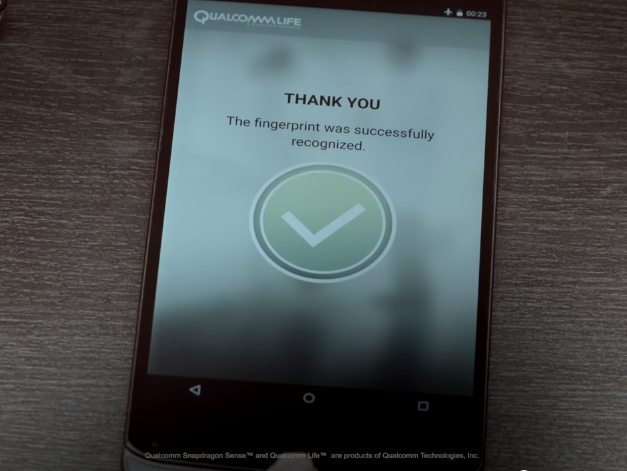Qualcomm's Sense ID Fingerprint Reader To Be Used By Japan's Largest Wireless Carrier
Qualcomm announced that NTT Docomo, Japan's largest wireless carrier, will begin using the company's Sense ID fingerprint reader for its biometric authentication service.
Sense ID is not just Qualcomm's answer to Apple's Touch ID and the Samsung Galaxy S6's recent capacitive technology; it also seems to be a next-generation technology in many ways. Unlike Touch ID and the Galaxy S6 sensor, the Sense ID technology is not capacitive but ultrasonic.
This has multiple advantages. First, it doesn't require an actual, physical button on the device, which is especially great for Android devices, many of which don't have a home button on the front.
Being ultrasonic, it can simply work from behind the screen. For instance, instead of your regular "slide to unlock" type of virtual buttons on the screen, you could be asked to put your finger on the screen, and the device would unlock while simultaneously authenticating you as the owner of the device.
Other advantages of Sense ID over capacitive fingerprint sensors include better performance through dirt and oils on the users' fingers and a more detailed 3D representation of the fingerprint. These two advantages should increase the chance of the device accurately identifying users. The 3D fingerprint representation is also useful in making the sensor more resistant to spoofing and cloning of the fingerprint.
NTT Docomo recently joined the FIDO Alliance, just like Qualcomm, and the new biometrics authentication service will work with the UAF (Universal Authentication Framework) FIDO standard. The UAF specification standardizes how the fingerprint is stored and processed on the device.
Qualcomm has also been working on its own protocol for using the local authentication of the fingerprint to log into online services, too, such as the one that will be launched by NTT Docomo. There aren't many details about this yet, but it would probably work somewhat similarly to Microsoft's Passport protocol.
Get Tom's Hardware's best news and in-depth reviews, straight to your inbox.
The main disadvantage of this is that Qualcomm's protocol is not a FIDO standard, and online authentication through biometrics won't be a FIDO standard that's implemented in devices likely until next year. It's not clear if or how Qualcomm plans to transition from its own custom protocol to FIDO 2.0's protocol next year for NTT Docomo's network.
NTT Docomo currently offers four smartphones that support fingerprint authentication on its network: Galaxy S6 edge SC-04G, Galaxy S6 SC-05G, Arrows NX F-04G and Aquos ZETA SH-03G. However, these don't use Qualcomm's Sense ID. NTT Docomo is expected to launch Sense ID-enabled smartphones from Sharp and Fujitsu along with its online authentication service on May 28.
Follow us @tomshardware, on Facebook and on Google+.
Lucian Armasu is a Contributing Writer for Tom's Hardware US. He covers software news and the issues surrounding privacy and security.
